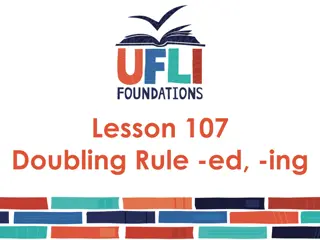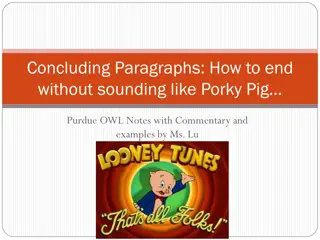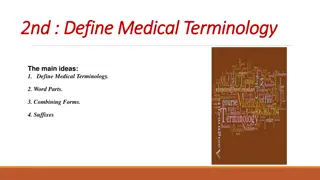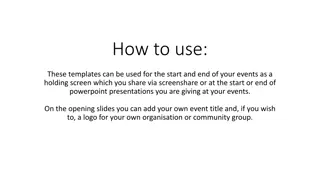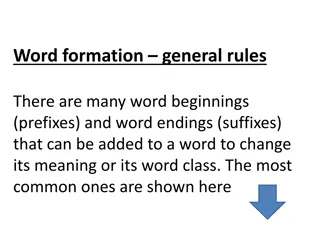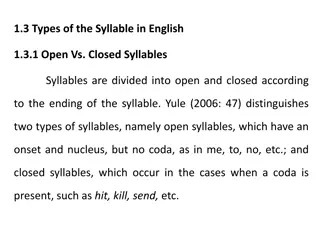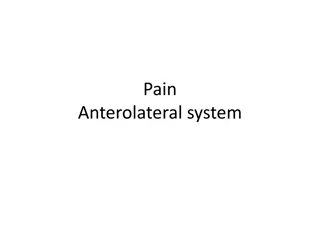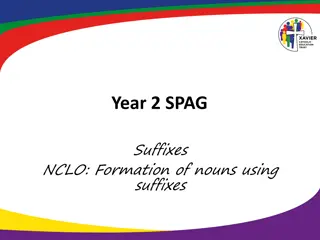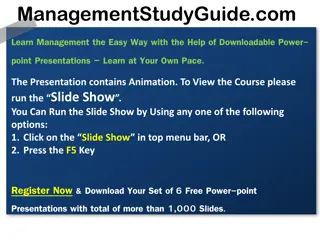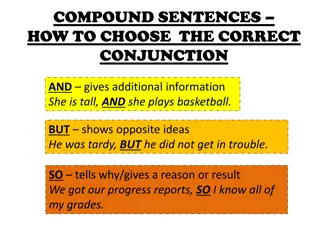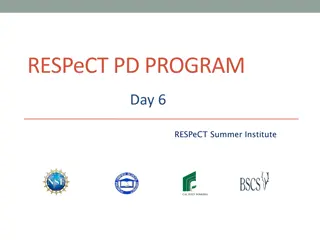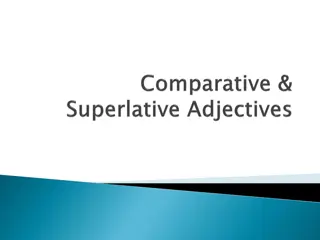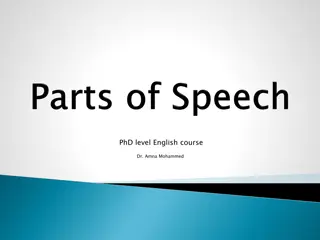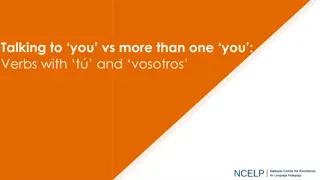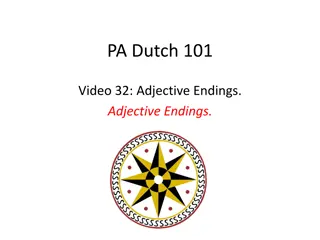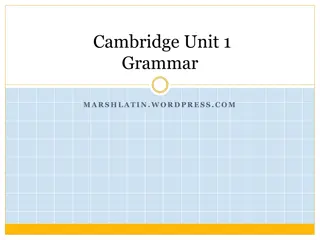Understanding Arabic Grammar: Nouns and Adjectives in Adjectival Constructions
Delve into the realm of Arabic grammar with this detailed lesson on nouns and adjectives, exploring their definitions and roles in adjectival constructions. Discover how adjectives agree with nouns in terms of gender, number, definiteness, and case endings.
1 views • 10 slides
Interactive Storytelling: The Earthworm and the Spider
Dive into the engaging tale of "The Earthworm and the Spider" through a series of thought-provoking questions and reflective insights. Explore themes of isolation, unity, and bravery as you follow the narrative from page to page, contemplating the author's intentions and the characters' motivations.
2 views • 11 slides
NAMI Family Support Group Model Overview
This content provides an insightful introduction to the NAMI family support group model, emphasizing the importance of having a structured model to guide facilitators and participants in achieving successful support group interactions. It highlights the need for a model to prevent negative group dyn
6 views • 23 slides
Elan Developer|Elan Group|-Transforming Gurgaon With Remarkable Projects
In the ever-evolving landscape of Gurgaon, where skyscrapers compete for attention and innovation is the norm, one name stands out for its visionary approach to real estate development \u2013 Elan Group. With a commitment to creating spaces that redefine luxury, functionality, and sustainability, El
9 views • 1 slides
What is the Process for Group Booking with JetBlue Airlines?
Group reservations for ten or more passengers can be made with JetBlue Airlines, which also provides advantages including customizable payment methods and dedicated Group Sales support. Customers can get in touch with JetBlue's specialized team directly or fill out an online Group Travel Request for
8 views • 5 slides
Understanding the Doubling Rule for Adding -ed and -ing Endings
Explore the rules for doubling consonants when adding -ed and -ing endings to words in English. This lesson provides clear examples and explanations to help you master this important aspect of grammar, leading to improved writing skills.
3 views • 81 slides
Combined Civil Service Group-1 Examd Eligibility criteria
The Group-1 exams are conducted by the Tamil Nadu Public Service Commission (TNPSC) and aim to select individuals for top-level government positions within the state\nSteps\/Stages in the Selection Process for Group 1:\nThe Group-1 exams take place in three stages:\nTo know more: \/\/obcrights.org\/
3 views • 5 slides
Understanding Attraction and Intimacy in Relationships
Exploring the dynamics of attraction and intimacy, this content delves into the factors that lead to friendship and romantic connections. It discusses the role of proximity, physical attractiveness, similarity, complementarity, and relationship rewards in forming bonds. Additionally, it examines the
2 views • 52 slides
Exploring Nonsense Poetry with Year One Students
Delve into the world of Nonsense poetry with Year One students as they explore rhyming words, create new endings for nursery rhymes, and decipher classic rhymes like "Mary Had a Little Lamb" and "Humpty Dumpty." Engage in creative activities that spark imagination and laughter, making learning Engli
0 views • 14 slides
Crafting Strong Conclusions: A Guide for Effective Endings
Conclusions in academic writing serve to wrap up discussions, restate key points without repetition, and possibly suggest future research directions or call to action. It is crucial to avoid introducing new information in the conclusion and aim for clarity and conciseness. This guide provides insigh
0 views • 6 slides
Understanding Group Dynamics and Its Impact on Collaboration
Explore the nuances of group dynamics, from positive teamwork to common challenges like social loafing and group polarization. Delve into the benefits of group participation, types of groups, and personal reflections on group interactions. Gain insights into how group processes can shape individual
0 views • 12 slides
Understanding Medical Terminology: Key Components and Usage
Medical terminology is a specialized language used by healthcare professionals worldwide, rooted in Greek and Latin words. It comprises word parts, such as roots, prefixes, and suffixes, which are crucial for forming and understanding medical terms. The combining forms aid in pronunciation and help
2 views • 17 slides
Customizable Event Templates for Professional Presentations
Elevate your event presentations with these versatile templates designed for the start and end of your events. Customize them with your event title, organization logo, and event details. Perfect for sharing via screenshare or incorporating into your PowerPoint presentations for a polished touch. Two
0 views • 8 slides
Overview of Group 16 P-Block Elements
Group 16 P-Block Elements, also known as Group VIA or Chalcogens, include oxygen, sulfur, selenium, tellurium, and polonium. These elements exhibit varying properties from non-metallic to semi-metallic to metallic. The group shows a general trend of increasing metallic properties down the group, alo
0 views • 26 slides
Guidelines for Forming Singular and Plural Nouns
This collection provides clear guidelines for forming singular and plural nouns, including adding "-s", "-y endings, and "-ies". It also covers exceptions, proper nouns, and tips on pluralizing certain words. Learn when to add "-es", double consonants, or when a false pronunciation might occur.
0 views • 21 slides
Word Formation Rules and Examples
Explore the general rules of word formation, including prefixes and suffixes used to modify meanings and word classes. Learn how to create verbs, adverbs, nouns, adjectives, and more through the addition of specific endings to base words.
0 views • 17 slides
The Earthworm and the Spider: Student Book Insights
Delve into the student book "The Earthworm and the Spider" with a pre-reading image, engaging content, and post-reading reflections. Explore themes of isolation, friendship, fear, and new beginnings through questions, answers, and group activity suggestions. Uncover the story's essence through the e
0 views • 11 slides
Mastering Present Tense - Irish Verbs Practice Guide
Explore how to conjugate 1-syllable broad verbs in the present tense in Irish, including forming questions and negatives. Practice conjugation with examples and learn the rules for adding endings to verb roots. Enhance your understanding of everyday language use.
1 views • 6 slides
Noun Declensions in Latin - Rules and Examples
Explore the declensions of nouns in Latin for the second declension, including masculine and neuter genders. Learn about the endings for singular and plural forms, along with specific rules for each gender. Dive into the differences between masculine and neuter noun declensions with detailed explana
0 views • 7 slides
Understanding the Components of Social Group Work
Social group work involves various components such as group objectives, programs, and workers. Group objectives focus on correction, prevention, growth, enhancement, responsibility, and participation. Programs are carefully planned activities that meet the needs of individuals and groups, while work
0 views • 6 slides
Understanding Syllable Types in English Language
Syllables in English are categorized into open and closed syllables based on their endings. Open syllables have an onset and nucleus without a coda, while closed syllables include a coda. Additionally, syllables can be simple (with a vowel or single consonant) or complex (with consonant clusters). T
0 views • 6 slides
Understanding Termination Phase in Group Work
The termination phase in group work, as illustrated by Mr. Vijay Sansare, an Assistant Professor, is crucial for the overall success of the group. Factors influencing group endings, planned versus unplanned terminations, and the emotional aspects involved in concluding group work are explored. This
0 views • 10 slides
Present Tense Verbs in Irish Grammar: Everyday Usage & Structure
Explore how to form and use present tense verbs in everyday Irish language with 2 to 2-syllable broad verbs, including rules for endings and changes. Learn how to ask questions, form negatives, and practice verbs for buying, hurting, and cycling with clear examples.
0 views • 6 slides
Understanding Pain: Mechanisms and Pathways
This content delves into the intricate mechanisms of pain perception, exploring the anterolateral system, nociceptors, endogenous analgesic systems, and more. It covers topics such as free nerve endings, VR1/Capsaicin receptors, referred pain, neuropathic pain, hyperalgesia, and visceral pain. The m
0 views • 15 slides
Exploring Noun Formation with Suffixes - Year 2 SPAG Activities
Dive into the world of noun formation using suffixes in this engaging Year 2 SPAG lesson. Discover how suffixes transform verbs into nouns, identify job titles by adding the suffix "-er" to action words, understand emotions through "-ment" suffixes, and recognize qualities with "-ness" endings. Enga
0 views • 10 slides
Mastering Group Discussions for Effective Communication and Decision-Making
Explore the world of group discussions with this comprehensive guide. Learn about the importance of group discussions in problem-solving and decision-making. Understand the process involved in conducting successful group discussions, from seating arrangements to evaluation criteria. Gain insights in
0 views • 11 slides
Mastering Compound Sentences: Choosing the Correct Conjunctions
In compound sentences, choosing the correct conjunction (AND, BUT, SO) is essential to convey the intended relationship between ideas. This task involves matching sentence endings to conjunctions, understanding how each conjunction functions in forming connections between clauses. Through examples a
0 views • 8 slides
Day 6 Review and Strategies for Science Content Storyline Coherence
Explore Day 6 of the RESPeCT Summer Institute focusing on reflections, lesson analysis, and deepening science content about the Sun's effect on climate. Discover strategies like STeLLA B, I, and 7 for developing coherent science storylines and enhancing student learning. Engage in discussions on les
0 views • 65 slides
Comparative and Superlative Adjectives Usage Guide
Discover how to form and use comparative and superlative adjectives to compare two or more nouns. Learn the rules for adding -er or -est endings, using "more" or "most," and irregular adjectives like "good" and "bad." Follow step-by-step formulas to create sentences with comparative and superlative
0 views • 11 slides
Understanding Subject-Verb Agreement in English Sentences
Explore the concept of subject-verb agreement through examples about the human body. Learn about singular and plural nouns affecting verb usage, common patterns in verb endings, and exceptions to verb conjugation rules in English sentences.
0 views • 15 slides
Spelling Practice for Year 3 and Year 4 Students
Improve spelling skills with word lists for Year 3 and Year 4, focusing on nouns created with suffixes -ness and -ment. Engaging exercises with missing word endings to reinforce learning. Enhance vocabulary and word recognition for young learners.
0 views • 44 slides
Comparative and Superlative in Pennsylvania Dutch 101
Covering the formation of comparative and superlative forms in Pennsylvania Dutch (PD), the content explains how PD adjectives add endings and change stem vowels to express comparison. It discusses irregular adjectives and provides examples to practice forming comparative forms in PD phrases.
0 views • 11 slides
Understanding Medical Terminology: Prefixes, Roots, and Suffixes
Exploring the world of medical terminology can be engaging and educational by delving into prefixes, root words, and suffixes. Prefixes alter the meaning of words, whereas root words are the base meanings, and suffixes modify the word endings. By combining these elements, new medical terms are forme
0 views • 9 slides
Shakespeare's Endings: A Study of Conclusions in His Works
Explore the fascinating endings of Shakespeare's plays, from tragic deaths to joyful unions. Delve into the textual construction of these endings and the aftermath when the curtains close. Discover how different genres influence the climax and resolution of Shakespeare's masterpieces.
0 views • 25 slides
Essential Elements of English Grammar Explained by Dr. Amna Mohammed
Comprehensive overview of key components in English grammar - nouns, adjectives, pronouns, verbs, conjunctions, prepositions, adverbs, and interjections - vital for improving writing skills. Detailed explanation of noun markers, endings, and the importance of verbs, including linking verbs, in sente
0 views • 37 slides
Spanish Verb Endings for Addressing One Person vs. Multiple People
Spanish uses different verb endings for addressing one person (tú) and multiple people (vosotros). This resource provides examples of regular Spanish verbs with endings for one person and more than one person, as well as exercises to practice identifying the correct verb forms. Visual aids and enga
0 views • 21 slides
Understanding Group Dynamics in Team Environments
Group norms play a crucial role in shaping behavior within a team setting, whether through prescribed norms taught to new members or emergent norms that develop through group interactions. Group roles like initiator, facilitator, and agitator also impact how a team functions. Effective initiators co
0 views • 27 slides
Understanding Adjective Endings in Pennsylvania Dutch (PA Dutch 101)
Adjectives in Pennsylvania Dutch are used to describe nouns, similar to English. Depending on the situation, adjectives either follow special endings or do not take an ending. Three main situations affect adjective endings when used with definite articles, indefinite articles, or independently. Addi
0 views • 14 slides
Understanding Latin Noun Cases and Declensions
Explore the use and distinctions of Latin noun cases (Nominative, Genitive, Dative, Accusative, Ablative), along with the concept of declensions, genders, numbers, and cases. Learn how to determine the declension, gender, number, and case of a Latin noun through its endings, and delve into examples
0 views • 23 slides
Understanding the Significance of Beginnings and Endings in Writing
Beginnings and endings play vital roles in capturing and maintaining reader interest. The opening sentences set the tone and purpose, offering a glimpse into the content, while conclusions provide closure. Academic introductions typically present context and a thesis statement, appealing to specific
0 views • 25 slides





